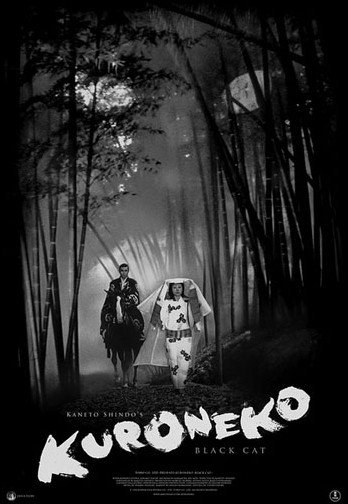 This was filmmaker Kaneto Shindo’s follow-up to his unquestioned masterpiece ONIBABA (1964). The highly ambitious KURONEKO isn’t up to the same high standards, but does contain stunning black-and-white photography and some genuinely startling elements.
This was filmmaker Kaneto Shindo’s follow-up to his unquestioned masterpiece ONIBABA (1964). The highly ambitious KURONEKO isn’t up to the same high standards, but does contain stunning black-and-white photography and some genuinely startling elements.
…stunning black-and-white photography and some genuinely startling elements.
ONIBABA was an international sensation, so it made sense that its writer-director turned out a similar film a few years later. That film was 1968’s YABU NO NAKA NO KURONEKO (THE BLACK CAT FROM THE GROVE), or simply KURONEKO, which recycles many elements from ONIBABA, notably its central motif of two women waylaid by sadistic samurai. Unfortunately, while ONIBABA is fairly well known and readily available (on Criterion DVD), KURONEKO has become (in the U.S. at least) somewhat obscure.
ONIBABA was an international sensation, so it made sense that its writer-director turned out a similar film a few years later.
An old woman and her stepdaughter live alone in a rural house, awaiting the return of the younger woman’s samurai husband from the battlefield. But before this can occur a gang of wandering samurai kill the women and burn down the house, leaving two dead bodies that are resurrected by a ghostly cat.
The women’s’ spirits are driven by revenge, and lure samurai to their new residence, a ghostly manor. There the younger woman beds the men and rips their throats out. After several samurai have been killed in this manner the local governor demands that the perpetrators be tracked down and killed. He picks out the strongest of his samurai, who just happens to be the son of the old ghost woman and the husband of the younger one.
Setting off on his quest, the samurai immediately runs into the two women, not realizing they’re the very ones he left behind. It doesn’t take him long to figure this fact out, however! Faced with a quandary—should he stick to his mission and kill the women?—he decides to settle down with his spirit-wife. This doesn’t last long, as the spirit in question, having strayed from her purpose (to kill samurai), vanishes permanently.
The old woman ghost, however, is still extant, and plans to continue murdering any samurai she can find–including her own son. The latter tries to put a stop to her reign but succeeds only in cutting off one of her arms, which when separated from her body sprouts claws and dark fur like that of a cat. The samurai is ordered to undergo a 10 day purification ritual to rid himself of unclean spirits, together with the severed arm. This he does, not realizing that his mother desperately wants her arm back, and is willing to go to any lengths to get it!

Kaneto Shindo had an eye for pictorial beauty that rivaled those of such Japanese masters as Akira Kurosawa and Nobuo Nakagawa. Even when KURONEKO is at its most wrong-headed it’s always mesmerizing to look at, with impeccably ordered widescreen compositions. Amid all this brilliance and invention, Shindo includes some avant-garde touches (impressionistic lighting, moving backgrounds composited over static foreground shots), meaning that to get this film’s full effect you should view it on the biggest screen possible.
 Regarding the somewhat wonky narrative, it’s intriguing and audacious, harkening back to the seminal Japanese ghost stories of Lafcadio Hearn and Ueda Akinari. But it’s also a tad lopsided.
Regarding the somewhat wonky narrative, it’s intriguing and audacious, harkening back to the seminal Japanese ghost stories of Lafcadio Hearn and Ueda Akinari. But it’s also a tad lopsided.
The opening scenes of the ghostly protagonists carrying out the early stages of their vendetta, complete with eerie spectral appearances and aerial somersaults, have a haunting starkness and simplicity that favorably recall the abovementioned ONIBABA. Yet KURONEKO ultimately goes off the rails in a riot of sappy romance and unintentionally comedic B-movie elements (frankly, it’s hard not to laugh at the film’s signature image of a cat-woman with a hairy arm between her teeth) that feel out of place in this otherwise impeccably artistic effort.
Vital Statistics
KURONEKO (YABU NO NAKA NO KURONEKO)
Toho Company/Janus Films
Director: Kaneto Shindo
Producer: Nichiei Shinsha
Screenplay: Kaneto Shindo
Cinematography: Kiyomi Kuroda
Editing: Hisao Enoki
Cast: Kichiemon Nakamura, Nobuko Otowa, Kiwako Taichi, Kei Sato, Taiji Tonoyama, Rokko Toura, Hideo Kanze, Eimei Esumi, Masashi Oki, Rika Mizuki
